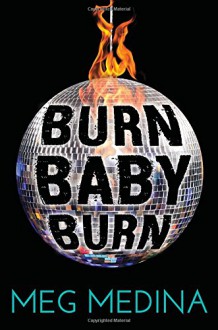
I read this book last month in the midst of a reading slump, when all I wanted to do was reread old favorites but the pressure of all the new books sitting on my library shelf was too much. I picked it up after getting home from work and read it in one evening, completely ignoring everything else I meant to do. I liked Medina’s Yaqui Delgado Wants To Kick Your Ass a lot–in fact, I was on the Cybils panel that shortlisted it the year it came out. But Burn, Baby, Burn is even stronger, in my opinion. It does so much so well that the only challenge is which of the threads to talk about.
For instance, there’s been a spate of YA set in the 1980s & 90s which seems to have no reason for that setting aside from nostalgia on the part of the author. By contrast, Burn, Baby, Burn not only engages with its historical setting, it could not possibly have been set in any other moment. Medina writes out of personal memory and experience, as her backmatter notes make clear, but she doesn’t stop there. The atmosphere of the summer of 1977 is woven into every scene and character.
There’s also a kind of mythologized, idealized NYC that exists in a lot of YA, as in a lot of other media. Medina resists that as well, pushing back against the idea of the glittering city full of a thousand possibilities. Nora’s city is on the edge of something, full of danger, full of people trying to make their way in a difficult world. It would be easy to say that it’s gritty, and I think that is wrong: it’s also full of hope and excitement. But it’s not smooth; when Nora visits her father and his new family, we see briefly the kind of NYC that usually appears in YA and feel the same relief that Nora does when she returns to her neighborhood.
Most of all, though, the setting here underlies and informs the characters. Medina draws everyone with understanding and complexity, but at the heart of the book is always Nora. Like her neighborhood, Nora is not smooth: she’s prickly, both self-assured and self-doubting, brimming over with hope and joy and fear. Medina shows a very specific Latina girl growing up in a particular neighborhood in NYC at a particular time in a particular family. But at the same time, Nora’s journey towards becoming a young woman resonates deeply.
I’m also grateful for the way that Nora’s story includes other girls and women on their own journeys. While she does navigate falling for a boy, the story starts and ends with Nora and her best friend Kathleen. We see their similarities and differences, but we also see the older generation. Kathleen’s mother and her black best friend (one of Nora’s neighbors) are both feminists, but we see the differences in their experiences as well. Without being the History of Feminism, we’re also given a picture of what the struggle for equal rights looked like in that moment, which doesn’t erase the experiences and legacy of women of color.
The final strand I wanted to note is the depiction of Nora’s family. Over the course of the book we see Nora slowly, slowly coming to terms with the fact that her brother Hector is truly dangerous to himself and to others. And once she realizes that, she also has to decide what she’ll do with that knowledge, in the face of her mother’s determination to not see. It’s a tricky thing to show that undercurrent of things not being okay, and Medina does it really well. Nora’s final decisions and determination in keeping herself and others safe is a really great and powerful way to tell this story. More teens than we sometimes realize or want to admit have families where things are broken, and a lot of growing up is learning to acknowledge this and find your own path.
This is definitely a book where difficult things happen, where the hard parts of being a teen aren’t shied away from. But there’s also a tremendous sense of hope and joy. There are second chances and learning to find your own place to stand and grow. There’s so much more to talk about here, but the heart of it–what’s stuck with me in the last month–is Nora’s courage and determination to do the best she can, by herself and by other people.

 Log in with Facebook
Log in with Facebook 









